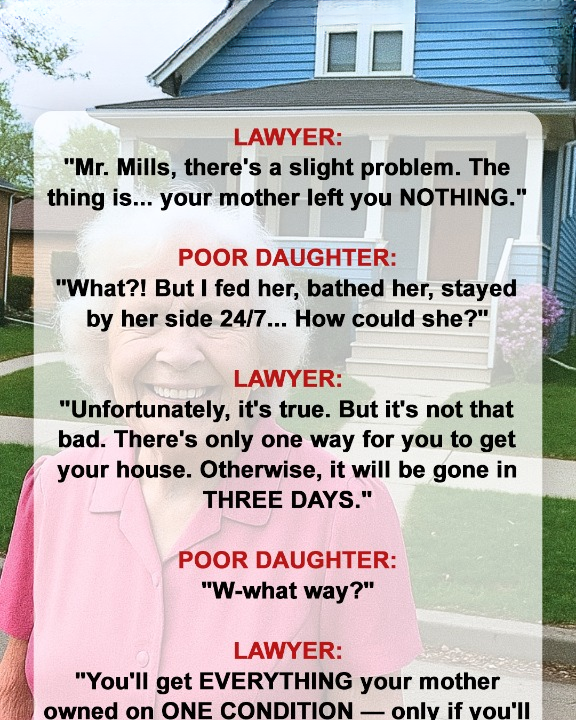
As her only daughter, I never doubted that my mother’s house would one day become mine. But when she passed, I didn’t find a will. Instead, there was a letter—one that changed everything.
It said I had three days to do one specific thing, or the house—and everything that came with it—would disappear from my life forever.
They say a mother’s house is a place of safety. For me, that was absolutely true.
My husband, our daughter Lily, and I had been living with my mother for years. On the surface, it seemed ideal—no rent, warm meals, and Lily had her grandmother by her side every day. People envied me. They thought I was lucky.
But they didn’t see what was behind the curtains.
The truth? That house wasn’t just a home. It was a fortress of expectations, pressure, and buried resentment.
My mother had been battling illness for over a year. I took care of everything—changing her sheets, cooking her meals, managing her medications. I watched her fade day by day, holding on to routines and dignity as best I could.
She rarely said thank you. She didn’t need to. I wasn’t doing it for gratitude—I was doing it because she was my mother.
When she passed, I was numb. But deep down, I expected one thing to remain: the house. I thought she’d leave it to me, not just because I was her only child, but because I’d earned it. I’d kept it standing.
Instead, I found a single envelope with my name on it.
Inside was a handwritten letter. No legal jargon. No will.
Just this:
“If you want to keep this house, you must return what you stole. You have 3 days. If not, the house will be donated, as per my instructions. You know exactly what I mean.”
I froze. Stole?
I hadn’t stolen anything.
I re-read it a dozen times. Was she losing her mind before the end? Or was there something I missed?
Then it hit me.
Years ago, during a family emergency, I had taken $10,000 from an old joint account she’d opened when I was in college. I never told her. I always meant to pay it back, but life got in the way. Bills. Lily’s school. Medical stuff. The money was gone—but the memory clearly wasn’t.
I thought she forgot.
Apparently, she didn’t.
I sat in the same living room where we had spent Christmases and birthdays, and I realized—she’d left me a choice, not a punishment.
It wasn’t about the money. It was about integrity. About owning my mistakes.
So I made the choice.
I called a local charity and donated the equivalent of what I had taken—$10,000. I sent the receipt to the lawyer whose name was scribbled at the bottom of the letter.
The next day, he showed up at the house.
“I was instructed to wait for this,” he said, holding the envelope I had sent. “You passed.”
He handed me a new document—one that legally transferred the house into my name.
“She didn’t want to give it to someone who wouldn’t do the right thing,” he added. “Even after death, she wanted to teach one last lesson.”
Now, when I look at these walls, I don’t just see childhood memories or echoes of pressure. I see the final challenge from a woman who raised me to stand tall—even if it meant standing in shame before standing in strength.
And I’ll never forget that love sometimes speaks in the form of a test.